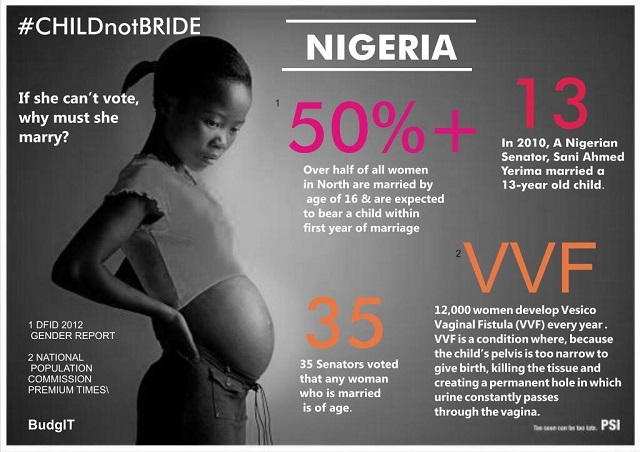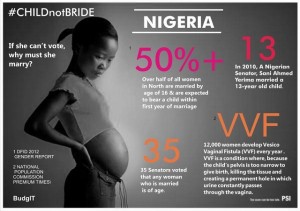
The nation is caught in the throes of protests and arguments surrounding happenings in the Senate that affect underage married females. Interesting as all the fascinating stories and creative insults being thrown around are, the question to be addressed is, what is the way forward? To find that out, we have to ‘start at the very beginning, a very good place to start’.
HOW IT ALL STARTED:
A section in the Nigerian Constitution reads:
29. (1) Any citizen of Nigeria of full age who wishes to renounce his Nigerian citizenship shall make a declaration in the prescribed manner for the renunciation.
(2) The President shall cause the declaration made under subsection (1) of this section to be registered and upon such registration, the person who made the declaration shall cease to be a citizen of Nigeria.
(3) The President may withhold the registration of any declaration made under subsection (1) of this section if-
(a) the declaration is made during any war in which Nigeria is physically involved; or
(b) in his opinion, it is otherwise contrary to public policy.
(4) For the purposes of subsection (1) of this section.
(a) “full age” means the age of eighteen years and above;
(b) any woman who is married shall be deemed to be of full age.
The clause in contention is the now infamous S 29(4)(b) and the senators had voted to remove it not only because Section 29(4)(a) ought to already cover married women (who ought to be over 18) but also because the clause appeared to endorse underage marriages. Put differently, section 29(4)(b) implies that married females under 18 are deemed to be of full age. By implication, the Constitution recognises underage marriages.
WHY IS EVERYONE SHOUTING?
The Child’s Right Act (CRA) by its Section 21 prohibits the marriage of persons under the age of 18. It states that “no person under 18 years is capable of contracting a valid marriage, and accordingly a marriage so contracted is null and void and of no effect whatsoever.” The Child’s Right Act is a federal law, while each State in the federation has to enact its own Child Rights Law for the provisions to become enforceable in that State. Currently, most northern states have not done this.
CHILD’S RIGHT ACT vs. CONSTITUTION: BATTLE OF THE LAWS
The CRA forbids child marriage and places the minimum age for marriage at 18, but this Act cannot stand in the face of S.1(1)(3) of the Constitution which makes any law inconsistent with the provisions of the Constitution to be void to the extent of its inconsistency. Simply put, any law in Nigeria that is not in line with the Constitution has to be dropped and what obtains in the constitution is what the courts will use to determine that matter. So if there is a faulty clause in the Constitution, until it is changed, no other more ‘proper’ law that is made can stand.
However, the Constitution does not place an age for marriage and S 29(4)(b) of the Constitution recognises the existence of wives below 18. This is the reason why Pro-clause people want it to stay. As long as it is neutrally recognised by the Constitution, the act of child marriage is not a clear crime.
The Senate wanted to remove the clause to make it consistent with the Child’s Right Act. A 2/3 vote for the removal had been reached before Senator Yerima showed up and made a fuss big enough to cause the Senate President to call for a fresh vote, and those who wanted the clause deleted, while still in the majority, lost the 2/3 edge, as some of their fold decamped.
SO ISN’T IT ALL OVER?
The Constitution is the supreme law of the country. The provision in question has been there before the 1999 Constitution. And this clause has been continuously used to validate the existence of child marriages.
The fight against child marriage cannot be fully successful because the people they are fighting for become classified as full-age adults the minute the marriage ceremony is concluded.
So, if we examine this carefully, we find that the problem starts before the minor is married off. Can a solution not be found before the marriage? If minors are not married off, there would be no need for the clause classifying them as ‘of full age’.
The solution is to criminalise child marriage. However, the Criminal Code that proscribes various punishments for unlawful acts of defilement and carnal knowledge of females below 16 does not apply in Abuja and northern states. The Penal Code that applies does not make any provision concerning this issue.
BACK TO SECTION 29(4)(b)
So, rather than delete or leave in the clause, an amendment of the wordings can make it possible for married minors to take advantage of the change of citizenship section. Perhaps the words ‘unlawfully married minor’ or ‘women under 18 married before the creation of the Child ‘s Right Act’ would be suited to the Senate majority’s cause. This way, they would not be attributing maturity to a 9 year old. I believe those who created the clause could see the reality of the situation and wanted to help married minors with this clause whenever they needed it and not for this description to be stretched to cover all aspects of life for the minor. However, the law is an ass, and the legislature needs to give the intent of the law clear language for proper interpretation. That is what they get paid big money for.
SO HOW SHOULD THE STORY END?
This may look like a circular chicken and egg story, but there is a clear beginning. And the Constitution starts it; the legislature has to clear up that clause. It is not just a keep in or take out deal, there is the option of amendment, such that it does not contravene a married woman’s right to change her citizenship and does not make an underage wife automatically an 18 year old adult.
Then there has to be a formal criminalisation of the act of child marriage to cover the entire country and not only the southern part. A child in the south does not miraculously develop maturity when she crosses into the north. The Penal (and even Criminal) Code has to be amended to clearly prohibit child marriages.
The cons of child marriage far outweigh any pros. How parents can even permit their children to get married when so young is amazing. More than physical, the psychological development needed to enter and stay in a healthy marriage (and not just marrying for marriage sake) is too important to ignore.
It is hoped that this situation can be resolved in favour of the child, and not the adults that marry them, or marry them off for self-serving reasons.


